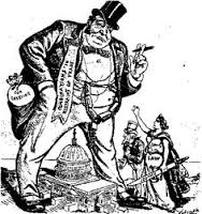
From Monthly Review:
[…] In consonance with what we might call this “leisure ethic” of pre-capitalism, which rejects the work-intensifying proclivities of bosses, the recorded history of early capitalist production in Europe and North America—at least outside of slavery—shows work as an integrated part of daily life, accompanied by eating and socializing, much to the chagrin of emerging industrialists. As Eric Wolf writes in his classic Europe and the People Without History, in European economies on the eve of industrialization, as long as industrial work was merely supplementary to the central work of keeping a farm, and had to compete with far more attractive recreational activities, such as holidays and family life, the organizers of industrial production would be searching for ways to “subdue the refractory tempers of work-people accustomed to irregular paroxysms of diligence,” in the words of one industrialist in 1835. The working-class life of balancing subsistence with leisure, which so irked the bourgeoisie, incorporated just enough production for capitalists as was necessary to satisfy a boss or tax man or to keep the wolf from the door, and no more.
The first attack on that independent working life was to create a system of measurement of labor based on time. The clock and the accompanying constant consciousness of time, and then the dedication of large portions of that now-measured time purely to a distinct activity called “work,” are elements of everyday existence that most of us can hardly fathom living without. Yet workers fought long and hard against this imposition of the time measurement of labor, and against the way in which designated work hours ripped apart the fabric of daily household life, which had blended conversation and community with economic activities […]
Read rest here
